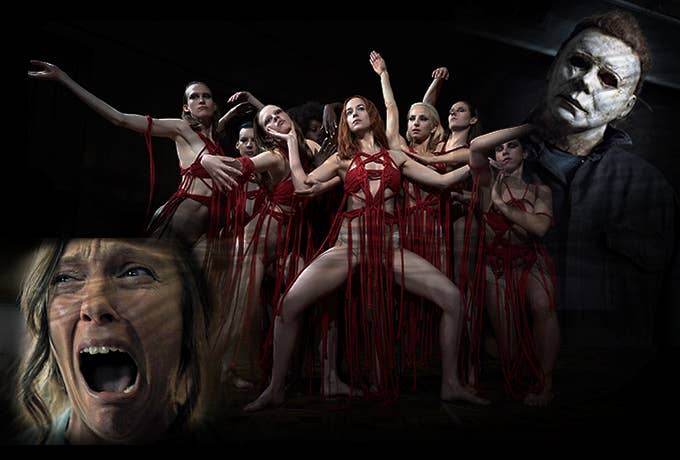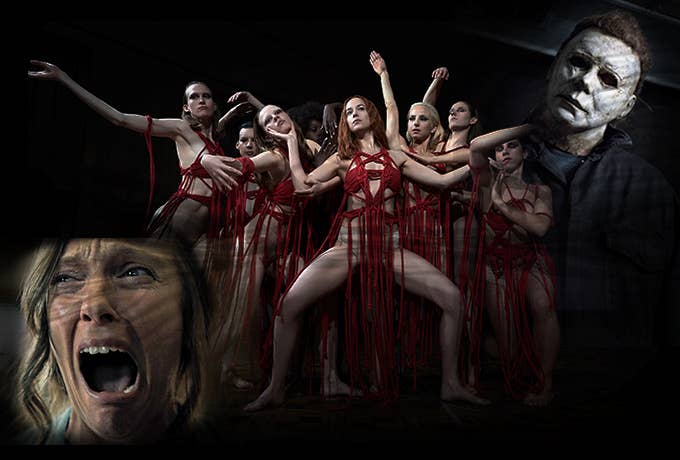
As Luca Guadagnino’s remake of Suspiria casts its spell on select theaters this weekend, David Gordon Green’s Halloween is reaping the benefits of already becoming the highest-grossing film of the franchise with the second-best October weekend debut ever. Totaling $76M in its domestic haul, Halloween’s opening was just a few million shy of beating Venom’s $80M debut, a record set earlier this month. It’s fascinating math when you look at the per-theater average, $19,405 vs. $18,884, and note that Blumhouse’s slasher film opened to 322 theaters less than Sony’s latest superhero venture. This feat follows the success of horror hits like Ari Aster’s Hereditary and John Krasinski’s A Quiet Place, which were also met with both critical acclaim and commercial success. Of course, that’s only scratching the surface of what the genre has given us this year.
2018 isn’t an anomaly, though. It’s been a particularly strong decade for horror as it continues to inspire filmmakers who have something to say in a way that shakes us at our core. Fear is a universal language that runs deep. With mainstream momentum in horror, however, comes an outpour of analysis dutifully working to deconstruct the genre and its success. Remember when everything was the new Babadook? Or the incessant need to label critical darlings as “highbrow” or “elevated” alternatives? For as long as horror has existed, it’s been the underdog in cinema. Scrutinized and misunderstood by an industry that never offered the genre or its visionaries a seat at the table.
With over twenty subgenres, horror is far from monolithic. Inherently inventful and resourceful, it’s evolved over time and its filmmakers eagerly explore more nuanced approaches to getting under our skin. That’s why horror films have consistently made headlines for defying expectations and garnering the type of acclaim typically reserved for Oscar bait. Jordan Peele’s Get Out was the first horror film to score a Best Picture nom since Darren Aronofsky’s Black Swan in 2011 and M. Night Shyamalan’s The Sixth Sense in 2000. And while Get Out didn’t take the trophy home, it won the Oscar for Best Original Screenplay and amplified the demand, once again, for the Academy and Hollywood at large to take the genre more seriously. Especially as these films delve deeper into relevant themes of our time. All eyes are currently on Toni Collette’s fiercely committed performance as a grieving mother in Hereditary.
Horror has always pushed the limits of filmmaking, and today’s generation of auteurs is no exception. There’s much to unpack when understanding the success of modern horror films, but like their predecessors, their study of the human condition, societal issues, and the root of fear underscores a particular corner of escapism. Pick any horror film in any decade and you’ll find a generation’s cautionary tale. Mix those elements together with a resourceful budget, strategic marketing, and an empathetic audience--and you’ve got yourself the makings of an impactful slice of horror cinema.
While the genre’s undeniably pushed filmmaking forward for decades, we’d be remiss to ignore just how impactful this new wave of horror has been. From this year’s standouts to recent gems like It Follows, Don’t Breathe, The Witch, It, the Purge franchise, Split, Happy Death Day, Get Out and others—really the list goes on—horror’s voice has cut through the noise and captured the zeitgeist of this decade. So what’s leading this charge?
As the world around us stirs in chaos, filmmakers have flocked to the genre as a means to create cautionary tales but also to remind of us our humanity. Released just last year, Peele’s social commentary in Get Out has already inspired others to take on the genre. John Krasinski cites Peele’s examination of race and toxic liberalism as the inspiration behind him writing and directing A Quiet Place, a wildly inventive story about family and the external forces that threaten our well-being. And while the two films differ in themes, they share a commonality in resonating with audiences in a way that garnered historic box office success and conversation.
Ari Aster made his directorial debut with Hereditary this year, which dove headfirst into the macabre elements of death, grief, and the unsettling quest for solace. Backed by a brilliant marketing campaign and supported by commanding performances from Aster’s cast, Hereditary became A24’s highest-grossing film worldwide. David Gordon Green’s success with Halloween also stems from an extensive campaign that evoked nostalgia and comfort, specifically between Jamie Lee Curtis and fans. During an appearance at Comic-Con, Curtis consoled a man who revealed a personal connection with the original film after surviving a violent attack of his own. It was a moving moment that illustrates an irrevocable bond that horror creates with viewers. And as we’ve seen, it pays off. Halloween is poised to be one of Blumhouse’s most successful projects as it continues its run in theaters.
There’s no doubt that independent, low-budget studios like A24 and Blumhouse command a very significant corner of the genre. Looking at the past decade alone, Blumhouse has produced and distributed lucrative franchises and original films that have seen huge returns against modest budgets. And A24? Hereditary, The Witch, Green Room, It Comes At Night, The Killing of the Sacred Deer, and The Blackcoat’s Daughter all came into cinemas with that coveted A24 stamp. These studios forge an organic relationship with the creators they work with, which prioritizes storytelling and resourcefulness in a way that lets vision thrive over oppressive studio mandates. Just look at M. Night Shyamalan, who returned to form with The Visit and Split after struggling to maintain control of his work years prior. His partnership with Blumhouse has yielded some of his most exciting films to date.
Horror is in a very inspired place right now. One could argue we’re witnessing a renaissance of sorts as directors up the ante. The Babadook comparisons to everything that came after tired quickly, but Jennifer Kent’s debut and David Robert Mitchell’s It Follows reinvigorated the genre in a way that encouraged filmmakers to align with creative forces who understand the nuanced line between fear and message. Even further, Peele has influenced this movement of seasoned creators like David Gordon Green, Danny McBride, and John Krasinski to explore horror for the first time. And now Luca Guadagnino, who helmed last year's beloved romance drama Call Me By Your Name, is taking a sharp left turn with the release of his nightmarish reimagining of Dario Argento's 1977 film Suspiria. It’s already been described as an auspicious transition for Guadagnino, who’s been praised for his daring and confrontational approach.
As horror lures directors and production entities who see the genre as a powerful vehicle for innovative filmmaking, rest assured these films will continue to outperform expectations and stay at the forefront of cinema for years to come. They never thought that horror would take it this far.

